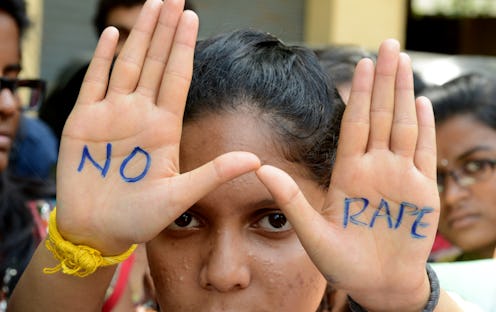Life
This Series On Sexual Assault Is So Powerful
Just in time for Sexual Assault Awareness & Prevention Month in April, the Rape, Abuse, and Incest National Network (RAINN) has released a campaign dedicated to speaking out about sexual assault — and moving past it. Although RAINN's Survivor Series features real survivors discussing their experiences with sexual assault, the campaign makes it clear that trauma doesn't define anyone, nor is it ever too late to seek help. In fact, for a variety of reasons, many survivors may not discuss their assault until years after the fact: RAINN reports that while half of its Online Hotline visitors spoke about assaults within the last six months, 30 percent discuss experiences that happened more than five years ago.
This is reflected in the diversity of experiences of the seven survivors featured in the campaign, which range from childhood sexual abuse to domestic violence to assault on college campuses. For instance, survivor Debra was abused beginning at age six, but it wasn't until 35 years later that she contacted RAINN.
Taking the time to heal is a common theme throughout the campaign; the majority of the survivors waited years, if not decades, before openly acknowledging their experiences. "You gotta believe that what happened to you wasn’t your fault," one survivor explains. "And then you can make that transition to being a survivor."
Of course, much of this could be attributed to living in a society that places responsibility for sexual assault squarely on the victims. In many cases, women are blamed for "enticing" someone to rape them, and men are blamed for not fighting off their attacker. Furthermore, the lack of frank discussion of sexual assault leads to an inflexible, stereotypical idea of those who do the assaulting. Often, the perpetrators are seen as faceless strangers who attack unsuspecting women walking alone at night, and when they don't fit that image, survivors are the ones who end up being questioned.
"It's not like [my assaulter] wore a sign saying, 'I'm a sexual predator,'" Adam says in his video. "He was that cool uncle."
It may seem obvious, but it bears repeating: Sexual assault happens to women and men — and the same is true for those who perpetrate assault. Although most reported sexual assault is man-on-woman, there's reason to believe that this is skewed by social norms about masculinity which may discourage male victims from speaking out. (RAINN estimates that 68 percent of all sexual asssault goes unreported to the police.) It's also worth noting that in contrast to traditional narratives of sexual assault, the vast majority of sexual violence is carried out by someone known to the victim. This is evident in the Survivor Series, in which most of the survivors were attacked by friends or family.
Needless to say, the series is difficult to watch at times, but its content is hugely important. "This campaign not only encourages victims and survivors to come forward and get help, but also speaks to the general public — helping to shape their understanding of sexual violence, and the unique role individuals can play in preventing and responding to survivors," said RAINN's vice president for communications, Katherine Hull Fliflet.
Watch a summary of the campaign below, and head over to RAINN's Survivor Series page for more information.
